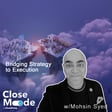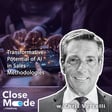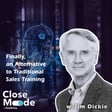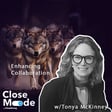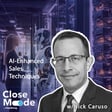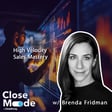
Disrupt or Be Disrupted: Insights w/Gordon Galzerano
In this episode, Brian Dietmeyer talks with Gordon Galzerano, President and CEO of SAMA, about the imperative of business disruption in today's fast-paced market. They explore the concept of "disrupt or be disrupted," discussing how companies must adapt to maintain competitive advantage in an era of rapid technological change. Gordon shares insights from his extensive experience in the IT industry, emphasizing the importance of innovation, agility, and strategic foresight in staying ahead of market transitions.
Timestamps:
00:25 Introduction of Gordon Galzerano and the episode's theme.
01:38 Discussion on why companies need to disrupt or be disrupted.
06:19 Gordon explains the three key aspects of why disruption is happening today.
11:08 Examples of companies that have successfully embraced disruption.
14:48 Gordon discusses the importance of small and transformative ideas in business.
17:00 How companies can enable their teams to think strategically and adapt to changes.
19:44 Closing remarks and appreciation for the guest's contributions.
